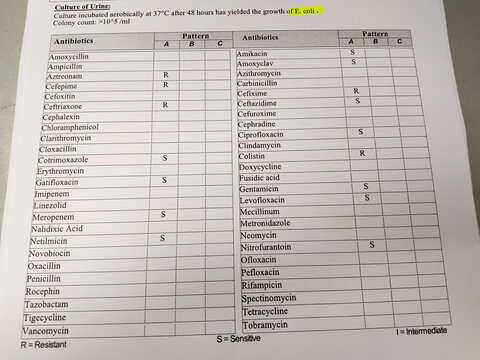Have you ever felt a burning sensation while peeing? Or maybe noticed a change in the color or smell of your urine? These are just some of the symptoms that could signal a urinary tract infection (UTI). And when these symptoms arise, it’s common for doctors to order a urine culture to determine the culprit behind the discomfort.

Image: stock.adobe.com
But what happens when the results come back “no growth”? Does this mean you’re in the clear, or could something else be brewing? This article delves into the world of urine cultures, explaining what “no growth” means, its possible causes, and what steps you should take to understand your health better.
Understanding Urine Cultures and “No Growth”
A urine culture is a laboratory test that helps identify the presence and type of bacteria in your urine. It plays a crucial role in diagnosing and treating UTIs. The process is simple: a sample of your urine is collected and incubated in a petri dish. If bacteria are present, they multiply and form visible colonies, allowing doctors to identify the specific type of bacteria causing the infection.
But sometimes, the petri dish remains clear, indicating “no growth.” This means there are no detectable bacteria in your urine sample. It might sound like good news, especially when you’re battling a urinary tract infection, but it’s not always a straightforward case.
What Does “No Growth” Really Mean?
While a “no growth” result in a urine culture could imply that you don’t have a bacterial UTI, it doesn’t necessarily mean you’re completely free of any urinary tract problem. Here’s why:
- Possible False Negative: The first point to consider is that the urine culture might not be completely accurate. Occasionally, errors in sample collection, processing, or incubation can lead to a false negative result. This is especially true if the bacteria causing the infection are fastidious, meaning they require specific conditions to grow.
- Non-Bacterial Infection: While bacterial infections are the most common cause of UTIs, other factors can contribute to symptoms like pain and discomfort during urination. These include:
- Viral or Fungal Infections: Sometimes, viruses or fungi might be responsible for urinary tract problems. Urine cultures typically don’t test for these organisms, so “no growth” in a bacterial culture doesn’t rule them out.
- Underlying Medical Condition: A variety of conditions, such as interstitial cystitis (bladder pain syndrome), kidney stones, or even certain medications can trigger similar symptoms of UTIs.
- Irritants: Some non-infectious causes like certain foods, drinks, or personal hygiene products can irritate the bladder lining, leading to discomfort.
- Atypical Bacteria: Some bacteria that cause UTIs might not easily grow on the standard petri dish used in urine cultures. These bacteria may require specialized growth conditions, and the culture might not be able to detect them.
So, What Should You Do If Your Urine Culture Shows No Growth?
If your urine culture reveals “no growth,” it’s crucial to have an open conversation with your doctor. They can review your symptoms, examine your medical history, and assess your overall health to determine the next steps.
- Further Testing: Your doctor may suggest additional testing, such as:
- Urine microscopy: This test examines your urine under a microscope to identify any abnormal cells or microorganisms.
- Blood tests: These tests can rule out underlying medical conditions that may be causing your symptoms.
- Cystoscopy: This procedure involves inserting a thin, flexible tube with a camera into your urethra and bladder to visually examine the lining of these organs.
- Treatment Options: Based on the results of the tests and your overall health, your doctor might recommend:
- Antibiotics: If an underlying bacterial infection is suspected, even without a positive culture, antibiotics might be prescribed. However, it’s important to note that antibiotics won’t be effective against viral or fungal infections.
- Pain Management: If the cause of your urinary discomfort is non-infectious, pain relievers like ibuprofen or acetaminophen can be helpful.
- Lifestyle Changes: Adjusting certain lifestyle habits might alleviate your symptoms. For example, drinking plenty of water, urinating frequently, and avoiding certain irritants like caffeine or alcohol can help.

Image: www.consultant360.com
Expert Insights and Actionable Tips
Dr. Sarah Jones, a renowned urologist, emphasizes the importance of a holistic approach to urinary tract problems: “When a urine culture shows no growth, it doesn’t mean you should dismiss your symptoms. It’s vital to work collaboratively with your doctor to uncover the root cause and seek effective treatment.”
Here are some key points to remember:
- Don’t Self-Diagnose: Avoid relying solely on internet information when it comes to your health. Always consult with your doctor for an accurate diagnosis and treatment plan.
- Educate Yourself: Understanding the nuances of urine cultures and potential causes of urinary discomfort can empower you to communicate your concerns and actively participate in your healthcare decisions.
- Maintain Open Communication: Establish clear communication with your doctor, detailing your symptoms and concerns. This partnership is crucial in navigating the complexities of diagnosing and treating urinary tract problems.
Urine Culture Results No Growth
Conclusion
A “no growth” result in a urine culture doesn’t necessarily imply a clean bill of health. Instead, it often requires further exploration to identify the underlying cause of your urinary discomfort. By seeking the guidance of your doctor, understanding your symptoms, and actively engaging in the diagnostic process, you can gain a clear picture of your health and find appropriate treatment or relief. Remember, your health is a journey of understanding, and communication with your healthcare provider is essential.






